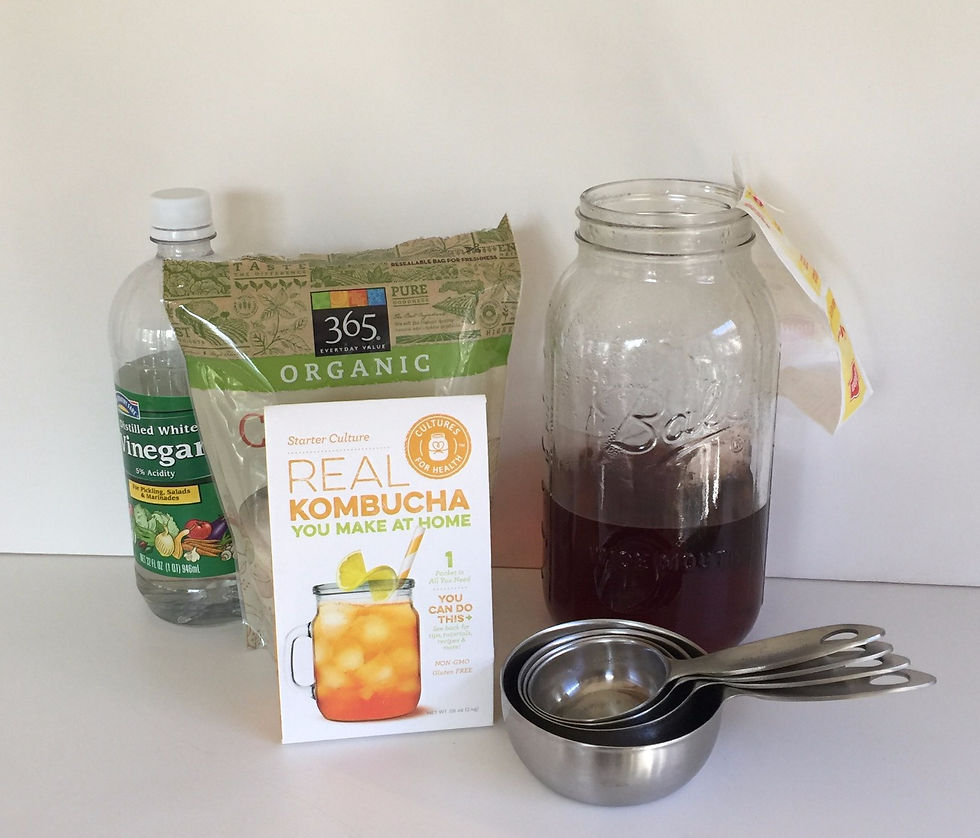All About that 'Buch
- Kate Madden
- May 11, 2017
- 6 min read

I feel like I'm always trying new things to enhance my overall health, like buying that magnifying lamp for when I am knitting on the couch to save my neck or adding some coconut oil to my coffee in the morning. I'll do my research and get really into it at first, but after a few weeks, it may fall by the way side. Case in point, I bought this “super food” powder at Whole Foods a while back to add to my morning smoothies. I figured it was an easy way to increase the amount of alkalizing greens and antioxidants in my diet. I really wanted to like it, but it turned my delicious (and already nutritious) smoothies into what tasted like a bag of fresh lawn clippings….which, needless to say, kind of ruined the whole smoothie experience for me. So, file that away in the fail column. While I may take the occasional misstep, I’ll also stumble upon some truly awesome game changers. For me, the best thing I did for my health all year was to start making my own Kombucha.
You may have heard about Kombucha from some hippy dippy yoga folks or seen it for sale at health food stores for $4 a pop (yikes!), but what is it? Well, I’m glad you asked. I usually tell people it is a fermented tea that has the same health benefits of yogurt but it’s really so much more. It’s made through a chemical process similar to that of beer, except the byproduct is a healthful balance of probiotics instead of alcohol. Ok, kombucha does have a tiny amount of alcohol in it, but it's less than 0.5% so you won't be getting drunk off of it (**unfortunately**). To make beer, you start with your sugar source (barley and hops) and then add yeast which turns it into alcohol and CO2... c’mon science! Kombucha is the same, but the sugar source is sweet tea, and instead of yeast, you use a SCOBY to kick off the chemical process. The word SCOBY is actually an acronym that stands for Symbiotic Colony of Bacteria and Yeasts. A SCOBY is a gelatinous, cellulose-based culture made up of a variety of bacterias and yeasts that feed off the sugar in sweet tea. Which is why kombucha is actually better for you than yogurt. Most yogurts contain only a couple types of good bacteria, but kombucha microorganisms produce a wide range of organic acids, vitamins and enzymes (Garib, 2009).
We all know probiotics are good for you but why is kombucha so great? When I decided to write this blog post I thought I had a pretty good understanding of how and why kombucha works, but then I started doing some research and realized there is actually tons of really good peer-reviewed scientific data out there supporting these health claims. Now, I’m a big science geek, so, I tried really hard to reign in my inner nerd and just keep it to these few points. Kombucha can help in the following ways:
Reduces cell damage caused by oxidative stress (Bhattacharya, 2011)
Reduces inflammatory problems (Vázquez-Cabral , 2017)
Boosts the immune system (Perdigon, 2001)
Detoxifies liver and kidneys (Aloulou, 2012)
Aids in digestion (Baschali, 2017)
I’ve seen lots of unscientific blog posts stating how kombucha cured their child’s behavioral problems or got rid of their wrinkles, and while those anecdotes are nice, there isn't any scientific evidence supporting those claims... well, at least not yet anyways. As for my own personal experience with kombucha, it's really helped my digestion. I’ve always had a hard time eating gluten. I don’t have celiac disease and I won’t die if I eat pizza, but I will definitely experience symptoms of gastric distress. Drinking kombucha has greatly improved my ability to digest these foods now. Which is great, since sometimes you just want a burger... am I right? And how sad are those gluten free buns? SO SAD.
How to Make it

So how do you make it? Well, the easiest way is to get a SCOBY that is already “activated” and some starter kombucha from someone you know that makes their own, which is how I got started. But you can also buy kits for making kombucha online. I wanted to try out one of the kits so I bought the Real Kombucha Starter by Cultures for Health on Amazon and it worked great. The only downside is you have to wait about a month for your dehydrated SCOBY to activate by soaking it in a vinegar and tea solution. But it is well worth the wait! So, once you have your activated SCOBY and starter kombucha in hand, here is how you make it:
Boil 6 cups of water and remove from heat
Add half cup of sugar and 6 tea bags (black or green tea work great)
Allow to cool to room temperature (4-6 hours)
Transfer to a glass or plastic container; these Bell jars are my favorite
Add your activated SCOBY (it’s okay if it doesn’t float)
Add your 1 cup of starter kombucha
Cover with a coffee filter, paper towel or cheese cloth moistened with a water and vinegar solution
Place in a room temperature spot out of direct light in kitchen
Ferment from 4 days to 2 weeks - I find 12 days is my sweet spot, but you can test it every couple days and drink it whenever it is to your liking. The longer you ferment, the more tart and vinegary it will become. If you feel like it gets too sour, just add more tea.
Pour into a separate container and place in fridge (reserve 1 cup of kombucha for next batch). This is the stage when you can add flavorings. I like any combinations of ginger, lemon, mint, basil and honey.
Secondary Fermentation
This is how you carbonate your kombucha so it has all the fun bubbles. Once you are done making your kombucha and you've added any optional flavors, instead of putting it in the fridge, screw the lid on the jar and leave it out to continue fermentation. You can also try adding a little extra sugar or some dried fruit (like a couple raisins or a date) to help fuel the chemical process. The carbon dioxide created during fermentation will build up and create carbonation. Wait 2 to 3 more days and then strain and transfer your kombucha to bottles or another jar.
More ‘Buch Tips
Each time you make a new batch of kombucha, a new “baby SCOBY” is made by forming a film at the surface where the liquid meets the air. These babies will accumulate on top of eachother and eventually create a large enough SCOBY that you can give to a friend or use to make a second jar for fermentation.
Avoid allowing any metal to come into contact with your SCOBY as this will inhibit growth.
When handling your SCOBY, wash your hands first then rinse them with vinegar. Most soaps are antibacterial which can actually harm the health of your SCOBY. Rinsing your hands with vinegar will remove any leftovers from antibacterial soaps and correct the pH.
There is such a thing as too much of a good thing! Like with most healthful things, going overboard with kombucha consumption can cause stomach upset. Kombucha is a great way to prevent yeast infections, especially if you are taking antibiotics, but drinking too much can actually cause an overgrowth of bacteria and yeast, so you may want to limit yourself to 1 glass a day.
If you let your kombucha ferment too long and it becomes too vinegary, don't throw it out! You can use it as you would vinegar and make salad dressings or marinades out of it.
If you have too many SCOBYS and can't find enough people to give them to, put them to good use by cutting them up and burying them in your garden. The probiotics are great for the health of your soil too.
For more awesome kombucha recipe tips and instructions for secondary fermentation, check out my friend Toni’s blog, Cultivated Wellbeing. She is a certified wellness coach based in California and has all the best paleo recipes!
References
Garib O: Effects of Kombucha on oxidative stress induced nephrotoxicity in rats. Chinese Medicine 2009, 4:23.
Bhattacharya S, Gachhui R, Sil PC: Hepatoprotective properties of kombucha tea against TBHP-induced oxidative stress via suppression of mitochondria dependent apoptosis. Pathophysiology 2011, 18(3):221–234.
Vázquez-Cabral BD, Larrosa-Pérez M, Gallegos-Infante JA, Moreno-Jiménez MR, González-Laredo RF, Rutiaga-Quiñones JG, Gamboa-Gómez CI, Rocha-Guzmán NE: Oak kombucha protects against oxidative stress and inflammatory processes. Chem Biol Interact. 2017 May 3;272:1-9. doi: 10.1016/j.cbi.2017.05.001.
Perdigon G, Fuller R, Raya R: Lactic acid bacteria and their effect on the immune system. Curr Issues Intest Microbiol 2001, 2(1):27–42.
Aloulou A, Hamden K, Elloumi D, Ali MB, Hargafi K, Jaouadi B, Ayadi F, Elfeki A, Ammar E: Hypoglycemic and antilipidemic properties of kombucha tea in alloxan-induced diabetic rats. BMC Complement Altern Med. 2012 May 16;12:63. doi: 10.1186/1472-6882-12-63.
Baschali A, Tsakalidou E, Kyriacou A, Karavasiloglou N, Matalas AL. Traditional low-alcoholic and non-alcoholic fermented beverages consumed in European countries: a neglected food group. Nutr Res Rev. 2017 Jan 24:1-24. doi: 10.1017/S0954422416000202.

































Comments